It has been 30 years since the fall of the Berlin Wall. The consequences of this event for Germany and for Europe to this day take central stage in discussions about the end of the Cold War. Essays on the repressive nature of the regime in East Germany and the wall’s purposeful construction to keep people in have been penned. The stories of those who managed to make it over, through, or under the wall to escape from the East to the West have been chronicled in books, documentaries, and movies. Much thought has also been devoted to discussing the strategic and geopolitical consequences of the fall of the Berlin Wall and the prospects for uniting a “divided continent” to achieve a Europe “whole and free.”
Often forgotten, however, is that the very same year, in a remote corner of southeastern Europe, a similar wall — also meant to keep people in — came crashing down, figuratively. The collapse of the impenetrable “green” border between communist Bulgaria (a member of the Soviet Bloc) and Greece and Turkey (members of the West) reverberates to this day as both a symbol of the European dream and the contradictions it faces.
The other wall
Unlike its counterpart in Berlin, this wall was mostly made of barbed wire and ran through the woods near the Black Sea and the idyllic Rhodope mountains along the Greek border. It was marked by restricted zones, state-of-the art surveillance equipment, and heavily armed guards with vicious dogs. The locals were coerced to report and spy on outsiders, in an attempt to root out potential defectors. Its purpose was to prevent people from fleeing the Soviet Bloc for the West. It appeared deceptively easy to cross, but 415 East Germans, Poles, Czechs, Hungarians, Chechens, and other Soviet citizens were killed trying to make it into Turkey. By comparison, estimates of deaths due to attempted Berlin Wall crossings range from 140 to 327. Coincidentally, the border lost its purpose exactly one day after the Berlin Wall collapsed, when Todor Khristov Zhivkov, the communist leader of Bulgaria, was ousted from power.
Ironically, his downfall came about not so much because of efforts to keep people from escaping the country but because of policies that forcefully displaced more than 350,000 members of the Turkish minority from Bulgaria into neighboring Turkey during the summer of 1989. This mass displacement targeted those in the Turkish minority who would not yield to Zhivkov’s insistence that they assimilate into a homogenous “Bulgarian socialist national identity” (they were told to change their names to Slavic ones, for instance). Pomaks, Bulgarian-speaking Slav Muslims, had in the past also met similar assimilationist policies, especially in the early 1970s, but were spared the mass deportation on this particular occasion.
The protests, riots, and international condemnation, including displeasure from Gorbachev’s Soviet Union, that followed culminated in a palace coup that saw Zhivkov’s removal from power at the hands of his own Politburo colleagues. After that, Bulgaria slowly and painfully transitioned from a communist to a multi-party democratic regime and from a state-planned economy famous for its tomatoes to a liberal market economy renowned for its Black Sea beaches and ski resorts.
After the fall
The two most significant consequences of the fall of this wall were arguably Bulgaria joining NATO in 2004 (as part of the second wave of former Warsaw Pact members to do so) and then the EU in 2007. These two memberships have brought strategic stability to democratic Bulgaria and unequivocally boosted its national security. In the 1990s, a political party representing mostly the Turkish minority even emerged, often acting as a “king-maker” in Bulgaria’s clientelist politics. Today, Bulgaria can be regarded as a true beneficiary of the post-Cold War dream of a Europe “whole and free.”
Considering the fate of countries in Bulgaria’s neighborhood, this is a major achievement. Other former Soviet Bloc countries like Moldova, Ukraine, and Georgia — which once aspired to NATO and EU membership but failed to achieve it — suffer the economic, security, and geopolitical consequences of being left in the cold of Russia’s reconstituted “near abroad.” Turkey, once a destination country for escapees from Bulgaria, is not faring much better, especially since its EU accession process ground to a halt, its economy began to fail, and its NATO membership became increasingly contested against a backdrop of deepening strategic relations with Russia. The Western Balkans are in a similarly precarious state, further jeopardized by the recent European Council decision, pushed by French President Emmanuel Macron, to put the membership prospects of the region on hold. This development benefits the nationalists and will likely spur a “new scramble” for economic and geopolitical influence by China, Russia, and Turkey.
Bulgaria’s economy and demographics are holding it back. Once the wall came down and passports were granted, Bulgarians began to leave the country in large numbers. The exodus of the young and talented intensified once Bulgarian citizens became eligible for free movement of labor with the EU. Bulgaria’s population, already suffering from low birth rates and aging, dropped from about 9 million in 1989 to a little over 7 million today. Coupled with persistent clientelism and corruption, these demographic developments have undermined the investment climate and the quality of public services, especially in education and healthcare. This has trapped Bulgaria in a vicious cycle, and it remains the poorest country in the EU.
Not surprisingly, this has facilitated the rise of right-wing populist politics, especially in more rural parts of the country that are in particular decline and has created political circumstances that ironically have led to the reconstruction of a tightly controlled border. This new wall, sanctioned by the EU, aims to keep migrants and refugees from entering Bulgaria and the EU. The effectiveness of this wall became evident during the 2015-16 migration crisis, during which most Syrian refugees and others made their way through Greece rather than Bulgaria. One commentator called Bulgaria’s border “Europe’s most hostile port of entry.”
An ongoing pursuit of “Europe whole and free”
Three decades on, the legacy of the fall of the Bulgarian wall on the remote edges of Europe is a mixed one. Bulgaria is no match for a unified Germany in economic, political, and strategic terms. Yet, its legacy as a country solidly grounded in the West in a difficult neighborhood needs to be better appreciated and understood, especially at a time when the liberal international order is in a precarious state. Its demographic and economic problems, as challenging as they may be, are no reason that Bulgaria might not be able one day to replicate the economic success story of Ireland, once also a poor country plagued by persistent emigration.
Finally, the collapse of the Bulgarian wall in the woods was an integral part of making Europe “whole and free” after 1989. Today, the reemergence of a Bulgarian wall where people fleeing violence and repression encounter abuse — almost reminiscent of a time before 1989 — is a troubling development and should give supporters of the European project and its ideals pause.
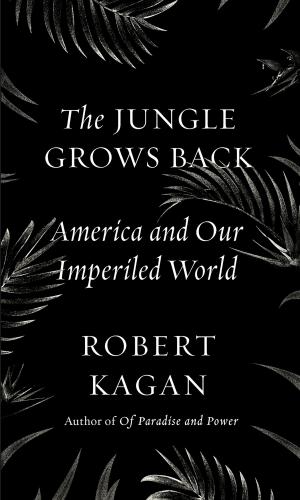
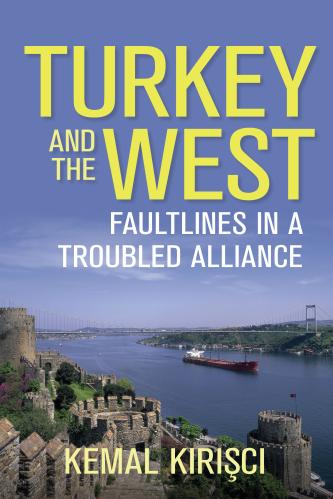
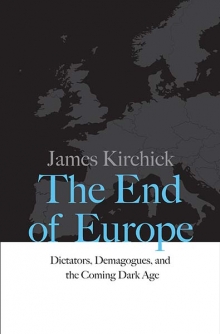
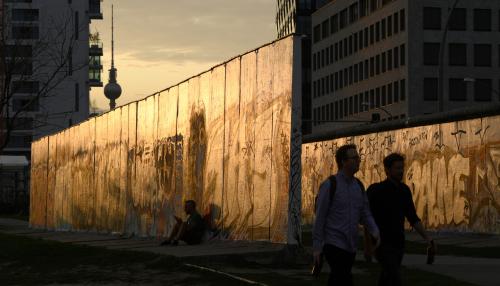



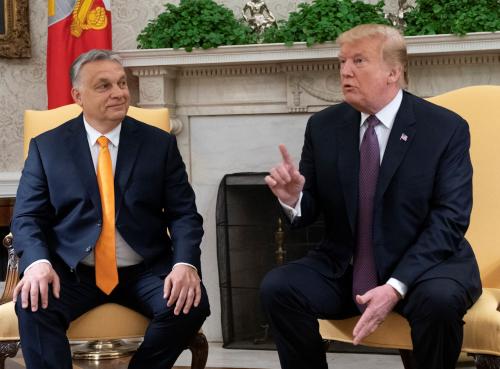
Commentary
Beyond the Berlin Wall: The forgotten collapse of Bulgaria’s ‘wall’
November 5, 2019